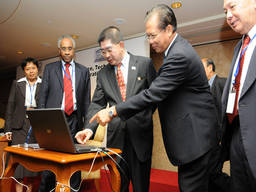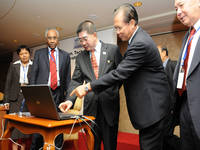The International Science, Technology and Innovation Centre for South-South Cooperation

Launch of the International Science, Technology and Innovation Centre (ISTIC)
The International Science, Technology and Innovation Centre for South-South Cooperation was inaugurated in Kuala Lumpur in May 2008. The centre functions under the auspices of UNESCO.
It facilitates the integration of a developmental approach into national science and technology and innovation policies, and provides policy advice. In parallel to organizing capacity-building and the exchange of best practices, the centre conducts research and tackles specific problems in science, technology and innovation policy-making in developing countries.
Background
Almost all developed countries have well-established science policy research centres providing training and policy advice, in addition to research. In many developing countries, however, this capacity is lacking, leading to fragmented, poorly coordinated science systems.
It was to help remedy this situation that the Government of Malaysia put forward a proposal for an international platform in Kuala Lumpur which would emphasize South-South cooperation. After examining a study prepared by UNESCO's science policy division on the feasibility of creating such a centre, the 58 members of UNESCO's Executive Board decided on 24 April 2007 to recommend that the centre be approved by all 193 Member States when they met the following October for UNESCO's General Conference. The Centre was subsequently approved by the General Conference.
Further reading
- A Way Forward for South-South Cooperation in Science, Technology and Innovation
- Read about the launch of the centre and the first decisions of its Governing Board
- ISTIC roundtable for partners (Kuala Lumpur, 2010)
- UNESCO-ISTIC conference on ethics of S&T (Bangkok, 2009)
- Read the report to UNESCO’s Executive Board on the feasibility study for the centre. ENG - FRE - SPA - RUS - ARA - CHI

